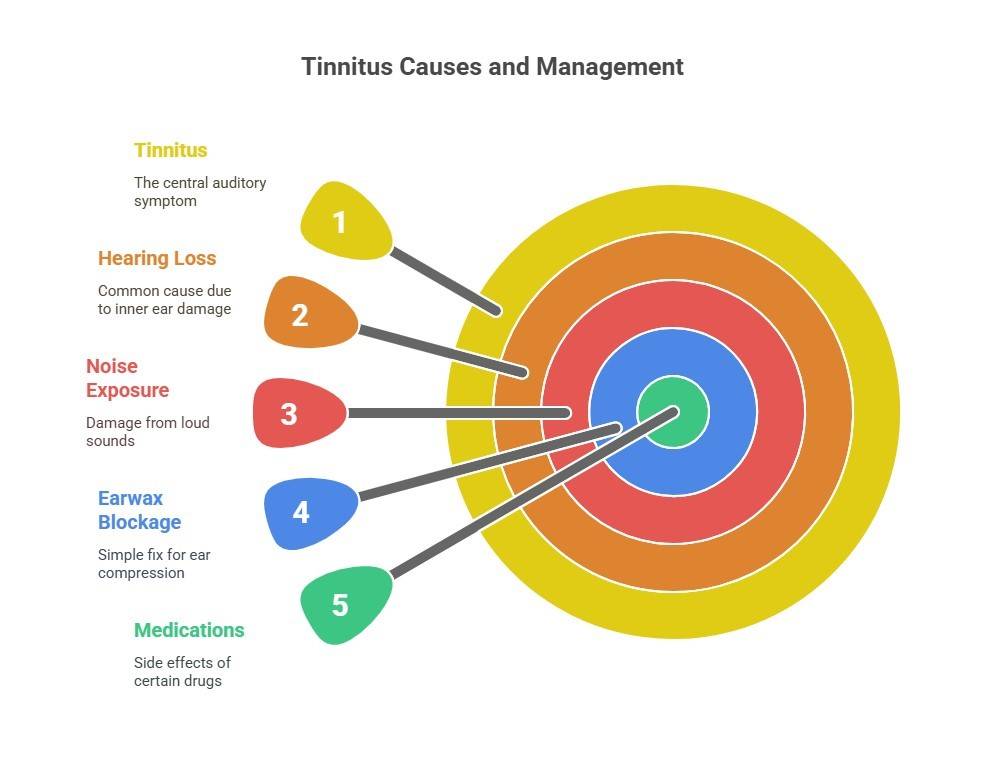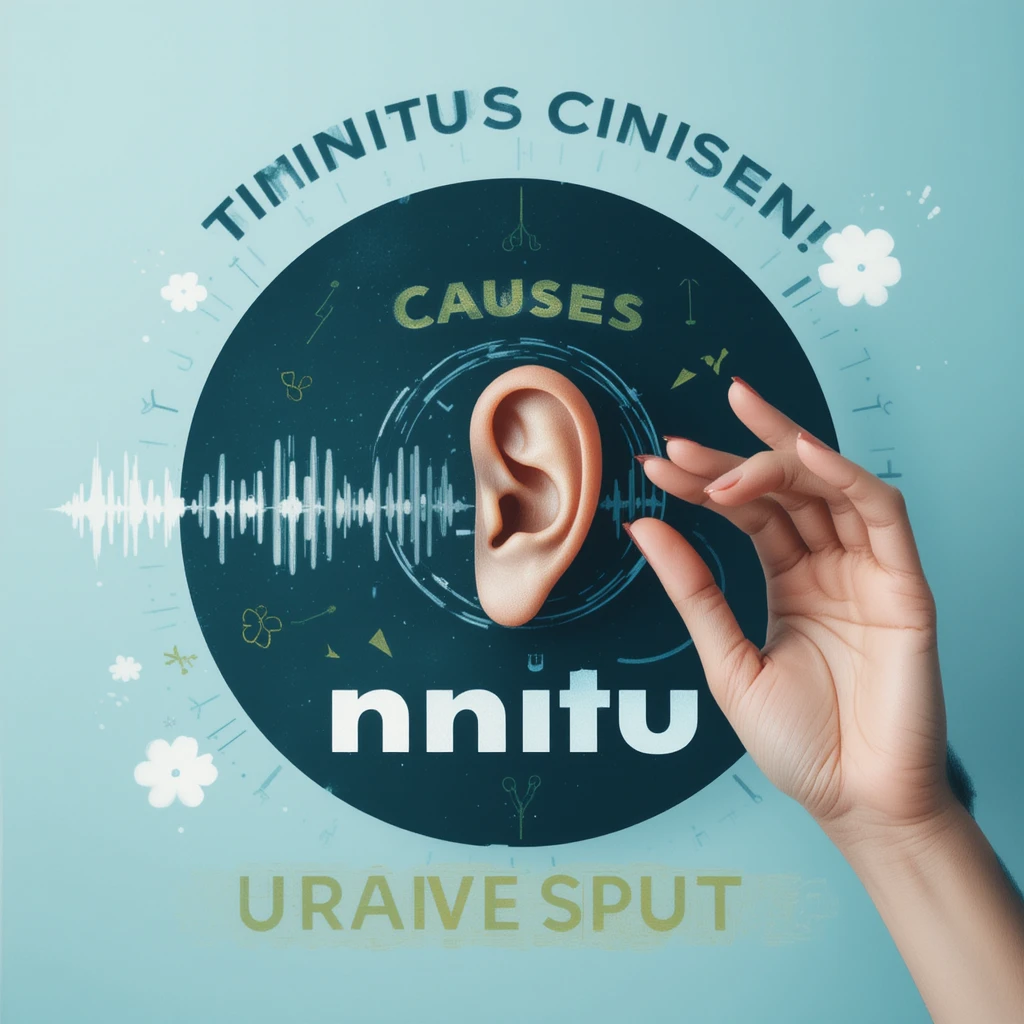Tinnitus causes are more common than you might think. I help people with ear ringing every day, and I know how frustrating it can be. When your ears won’t stop buzzing or ringing, finding the root cause is the first step to feeling better. The good news is that many tinnitus causes can be treated or managed with simple changes to your daily habits, proper medical care, or sound therapy techniques.
Understanding What Tinnitus Is and Its Common Tinnitus Causes
Tinnitus is not a disease itself but a symptom of something else happening in your body. The sounds people hear can be:
- Ringing
- Buzzing
- Clicking
- Whooshing
- Hissing
I have found that many people think they just must live with these sounds. But once you know what’s causing your tinnitus, you can often hone it.
About 15-20% of people have tinnitus at some point in their lives. Let’s look at the most common tinnitus causes so you can find relief.
The Top 10 Tinnitus Causes You Should Know About

1. Hearing Loss – The Most Common Cause
Hearing loss and tinnitus often go together. Over time, the inner ear’s fragile hair cells can wear out. When this happens, these cells send random signals to your brain even when there’s no sound.
I have worked with many older adults who didn’t realize their ringing in the ears was connected to age-related hearing loss. If you’re over 60 and have tinnitus, hearing loss is part of the picture.
2. Loud Noise Exposure – A Leading Tinnitus Cause
Noise-induced tinnitus can happen after just one loud concert or from years of working in a noisy place. High-volume noise can harm sensitive inner ear structures.
I once helped a construction worker who developed tinnitus after years without ear protection. Now he wears ear protection every day, but his tinnitus remains. This shows why it’s so important to protect your hearing before damage happens.
Sounds that can cause noise-induced hearing loss include:
- Concerts and loud music
- Power tools
- Gunshots
- Factory machines
- Lawn equipment
3. Earwax Blockage – A Simple Fix for Tinnitus Causes
Sometimes the answer is right in your ear canal – too much earwax! Excess earwax can compress your eardrum, triggering blockage-induced tinnitus.
I have seen many patients get instant relief after having excess earwax removed safely by a doctor. Never try to remove deep earwax yourself with cotton swabs, as this can push it deeper or damage your ear.
4. Ear Infections and Sinus Problems
Ear infections and tinnitus are linked because fluid buildup changes the pressure in your middle ear. This pressure can cause ringing, buzzing, or fullness in your ear.
The good news is that when your infection clears up, this type of tinnitus usually goes away too. I always suggest seeing a doctor if you think you have an ear infection, especially if you have pain or fever along with tinnitus.
5. Medications That Can Cause Ear Ringing
Some drugs can damage your hearing or cause ear ringing as a side effect. These are called ototoxic medications, and tinnitus is a known result.
Medicines that I think will cause tinnitus include:
- High doses of aspirin or NSAIDs
- Some antibiotics
- Certain cancer drugs
- Some diuretics (water pills)
- Certain antidepressants
I have worked with patients who saw their tinnitus improve after their doctor switched their medicine. Always consult your doctor before stopping any medication.
6. TMJ Problems – Jaw Joint Issues
Did you know your jaw can affect your ears? The temporomandibular joint (TMJ) is close to your ear. Problems with this joint can cause:
- Ear pain
- Tinnitus
- Headaches
- Jaw clicking
I like to check for jaw clenching or teeth grinding in patients with unexplained tinnitus. Sometimes treating the TMJ problem leads to less ringing in the ears.
7. Head or Neck Injuries and Tinnitus – A Hidden Connection
Were you in an accident, or did you hurt your head or neck? Even if it was years ago, this could be linked to your tinnitus now.
I remember working with a patient who started having an ear ringing after a car accident. The whiplash from the crash damaged nerves that affected hearing. Neck therapy eased her tinnitus.
Injuries can affect:
- Blood flows to your ear
- Nerves in your hearing system
- Brain areas that process sound
8. Blood Pressure and Circulation Issues
High blood pressure can cause a special kind of tinnitus called pulsatile tinnitus causes, where you hear your heartbeat in your ear. It results from blood surging powerfully through your vessels.
Things that can make this worse include:
- Stress
- Caffeine
- Alcohol
- High salt foods
- Being overweight
I suggest checking your blood pressure regularly if you have pulsing sounds in your ears. Sometimes treating the blood pressure helps the tinnitus too.
9. Meniere’s Disease – Inner Ear Disorder
Meniere’s disease is a rare inner ear condition that causes
- Severe dizzy spells
- Fluctuating hearing loss
- Tinnitus
- Feeling full in the ear
This condition needs medical care. I’ve seen how difficult these symptoms can be for people. While there’s no cure, doctors can help manage the symptoms with medicine, diet changes, and sometimes surgery.
10. Stress and Tinnitus – How Your Mind Affects Your Ears
Stress doesn’t directly cause tinnitus, but it can make it much worse. When you’re stressed:
- You notice annoying sounds more
- Your blood pressure rises
- Your muscles tense up, including those near your ears
I have noticed that many of my patients say their tinnitus gets louder during stressful times. Learning stress management techniques like deep breathing, meditation, or gentle exercise can help reduce how much tinnitus bothers you.
How to Know If Your Tinnitus Causes Needs Medical Attention
See a doctor about your tinnitus if:
- It starts suddenly
- You hear it only in one ear
- It happens with dizziness
- You also notice hearing loss
- It interferes with your sleep or concentration
I always tell my patients that sudden changes in tinnitus deserve prompt medical attention. Your doctor may send you to an ear specialist (ENT) or audiologist for more tests.
Home Care Options for Different Tinnitus Causes
While you’re finding out what’s causing your tinnitus, these tips can help:
- Use background noise like fans, soft music, or white noise machines
- Avoid very quiet rooms, which can make tinnitus more noticeable
- Cut back on salt, caffeine, and alcohol
- Get enough sleep (being tired can make tinnitus worse)
- Practice relaxation techniques
- Protect your ears from loud noises
I have tested many sound machines with patients, and most find that ocean or rain sounds work well to mask their tinnitus at night.
Medical Treatments Based on Tinnitus Causes
Treatment depends on what’s causing your tinnitus:
- If it’s earwax: Professional cleaning
- If it’s an infection, Antibiotics
- If it’s hearing loss, hearing aids address both issues.
- If it’s medication-related, your doctor might change your medicine
- If it’s TMJ: Jaw exercises or a mouth guard
- If it’s stress-related, Counselling or stress management
Sound therapy and retraining help your brain block out noise. I’ve seen successful results with these approaches, even when the underlying cause can’t be fixed completely.
Preventing Tinnitus Causes Before They Start
Many tinnitus causes can be prevented with these simple steps:
- Protect your ears around loud noise
- Keep the volume down on headphones and earbuds
- Take breaks from noise
- Get your hearing checked regularly
- Manage stress
- Keep your blood pressure healthy
I urge young concertgoers to wear earplugs. You can still hear the music, but you’ll protect yourself from tinnitus later in life.
Living Well Despite Ongoing Tinnitus Causes
For many people, tinnitus becomes less bothersome over time, even if the sound doesn’t go away. Your brain can learn to ignore it, much like you don’t notice the sound of a refrigerator running after a while.
Helpful approaches include:
- Sound enrichment – adding pleasant background sounds
- Cognitive behavioral therapy—reshaping your view of tinnitus.
- Tinnitus support groups – connecting with others who understand
- Healthy habits – sleep, exercise, and diet
I’ve watched many patients go from being very upset about their tinnitus to barely noticing it most days. Your brain has amazing abilities to adapt!
FAQs About Tinnitus Causes
Q: Can allergies cause tinnitus?
A: Yes, allergies can cause tinnitus. When you have allergies, fluid can build up in your middle ear. This can change the pressure in your ear and cause ringing or buzzing sounds. Treating your allergies might help reduce tinnitus.
Q: Is tinnitus a sign of something serious?
A: Most of the time, tinnitus is not a sign of a serious health problem. But sometimes it can be a symptom of:
- High blood pressure
- A tumor (very rare)
- Blood vessel problems
- A side effect of medicine
For safety, it’s wise to have it inspected.
Q: Can earbuds and headphones cause tinnitus?
A: Yes, earbuds and headphones can cause tinnitus if you listen to music too loudly. Follow the 60/60 rule: 60% volume, 60 minutes max.
Q: Can tinnitus go away on its own?
A: It depends on the cause. If your tinnitus is from a temporary problem like an ear infection or reaction to a medicine, it might go away when that problem is fixed. But tinnitus from hearing damage rarely goes away completely.
Q: Does stress make tinnitus worse?
Yes, stress frequently intensifies tinnitus. When you’re stressed, you tend to notice annoying things more. Also, stress can raise your blood pressure, which can make tinnitus louder. Finding ways to relax might help reduce tinnitus.
Conclusion: Seize Control of Your Tinnitus Triggers.
Finding out what’s causing your tinnitus is the first step to feeling better. While not all tinnitus causes can be cured, most can be managed successfully.
I encourage all my patients to be proactive about their ear health. Don’t just live with the ringing – find out what’s causing it and take steps to hone it. With proper care and sometimes simple lifestyle changes, most people can reduce how much tinnitus affects their daily life.
Remember, you’re not alone. Every day, millions manage tinnitus and thrive despite it. Whether your tinnitus is from hearing loss, earwax, stress, or something else, help is available.

Adel Galal is a health and wellness writer with over 30 years of experience studying and writing about health, fitness, nutrition, and healthy living. He is the founder of NextFitLife.com, where he shares practical, evidence-based guidance to support long-term health at any age. Adel’s mission is simple:
to help people make smarter health choices that fit real life, at any age.



